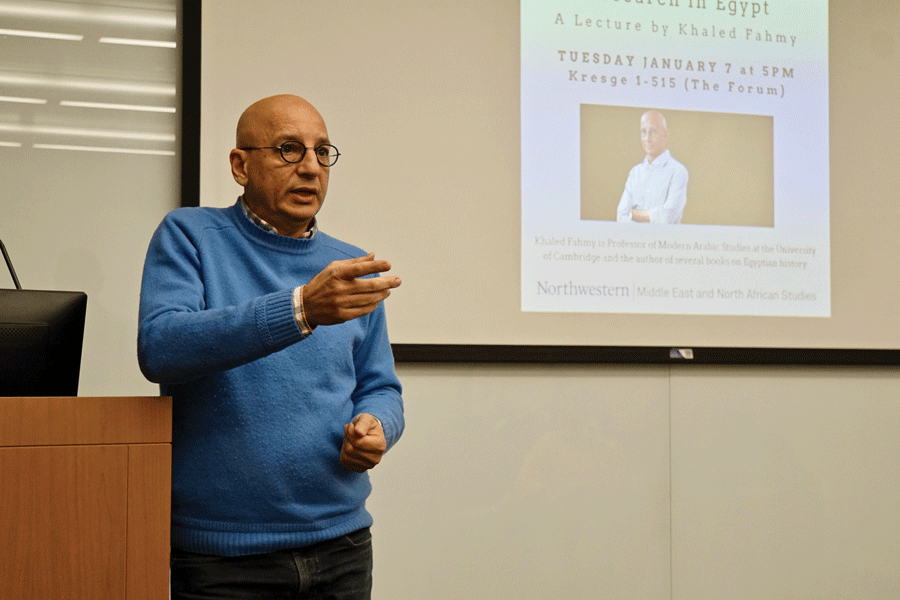Cambridge professor talks about the threat to academic research in Egypt
Photo by Owen Stidman/Daily Senior Staffer
University of Cambridge professor Khaled Fahmy speaks in Kresge Centennial Hall on Tuesday evening. Fahmy discussed the “promises and perils” of conducting academic research in Egypt.
January 8, 2020
University of Cambridge professor Khaled Fahmy discussed the Egyptian government’s crackdown on media and academic research at a lecture in Kresge Centennial Hall on Tuesday.
The event was hosted by Northwestern’s Middle East and North African Studies Program in conjunction with Weinberg Prof. Carl Petry’s research seminar course on the 1952 revolution in Egypt and the impact of British colonialism.
“A university like Northwestern sends people (to Egypt), mainly graduate students,” Petry said. “There are serious questions about their capacity to do research in a country like Egypt now.”
The Egyptian government under President Abdel Fattah el-Sisi has utilized surveillance technology to prosecute activists, researchers and journalists, according to Human Rights Watch. In 2017, the Committee to Protect Journalists ranked Egypt as one of the “world’s worst jailors” of journalists.
Fahmy, the Sultan Qaboos bin Sa’id Professor of Modern Arabic Studies at Cambridge, centered his lecture around the 2016 death of Giulio Regeni, an Italian Ph.D. student purported to have been tortured and killed by officials while conducting research on informal labor movements in Egypt.
“It was unprecedented,” Fahmy said. “Things have changed significantly since then.”
Fahmy said he observed a similar academic passion in his own students and persistent discrimination against conducting research. He also said he witnessed researchers being accused of spying. Regeni’s death, he said, was an escalation of oppression by the current regime that renders academic research and freedom of expression difficult for domestic and international scholars.
Many governments struggle to grasp the relationship between national security and freedom of information, Fahmy said. Still, he emphasized that the key to developing a stable and robust Egyptian state is to recognize the freedom of the press and intellectual ventures.
Weinberg sophomore Natalie Myren said she enjoyed Fahmy’s new perspective on the state of academic research in the international sphere.
“I think (Fahmy’s) takeaway was that one way to not just sit back and let nothing happen is to still try to do our work to research and be critical,” Myren said.
Sharon Hamilton, a Chicago resident, said she was compelled to travel from the city to Northwestern’s Evanston campus because she regularly consumes mass media and wants to be more informed on international events that are not often covered.
“I think (Americans) get so insular, that we only see everything through our lens,” Hamilton said.
Fahmy, who has been involved in educational reform movements, told an audience member he has not visited his home country in five years. The Egyptian university system continues to be increasingly unsupportive of researchers, he said.
“The ‘why’ is what I am interested in and that question is now being buried,” Fahmy said. “(The Egyptian government) has gotten away with murder.”
Email: [email protected]
Twitter: @yunkyomoonk
Related Stories:
Former Israeli Ambassador to U.S. speaks about changing Middle East
Egyptian protestor discusses social media’s role in revolution
Photojournalist shares Egyptian revolution experiences


